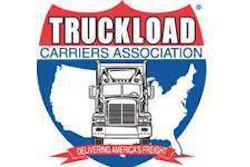The Federal Motor Carrier Safety Administration recently sent warning letters to 23,000 carriers that need to address areas of compliance, Administrator Anne Ferro said March 15.
The letters, which are less serious than an onsite audit, are part of the agency’s new Compliance, Safety, Accountability program, which outlines how FMCSA will intervene with carriers whose performance is sub-par.
Ferro spoke to Truckload Carriers Association members at TCA’s annual meeting in San Diego.
She said CSA and other regulatory initiatives support FMCSA’s three basic goals of raising standards for those entering the trucking industry, ensuring high standards for those in it and “getting the bad guys off the road,” meaning trucks, drivers, carriers, brokers or others.
Regarding the new plan for restarting cross-border trucking, Ferro said it has stronger safety standards than the 2009 pilot program. It will be “an opportunity for Mexico to lift the tariffs that have done so much harm to farmers and other industries in the U.S.”
A pre-operational component will include intensive screening of drivers, carriers and trucks. Carriers will be required to have U.S.-based insurance. Carriers that meet all safety criteria will receive provisional operating authority and will continue to be inspected. Those that continue to meet standards will receive full authority after 18 months.

Instead of using only GPS systems, as was done in the prior program, Mexican trucks will have electronic onboard recorders paid for by the U.S., at an estimated total cost of $500,000 to $700,000, Ferro said. FMCSA feels is necessary to have EOBRs in place for compliance, yet it could not demand Mexican carriers buy their own equipment because the North American Free Trade Agreement stipulates the U.S. cannot place demands on Mexican carriers that exceed those put on U.S. carriers.
Ferro also mentioned other pending or planned FMCSA matters:
• HOURS OF SERVICE. The agency received 25,000 comments, which are being analyzed for shaping the final rule.
• ELECTRONIC ONBOARD RECORDERS. Regardless of what form the final hours rule takes, Ferro said, it will be of little use if there is no effective way to monitor compliance. Comment on a proposed rule is being taken through May 23.
• BAN ON HANDHELD CELL PHONE USE BY COMMERCIAL DRIVERS. Comments on the proposed rule are being taken until March 22.
• COMMERCIAL DRIVER LEARNER’S PERMIT. The agency is about a month away from issuing a final rule.
• DRIVER PHYSICAL QUALIFICATIONS. It will be 12 to 18 months before FMCSA seriously addresses how obstructive sleep apnea and other physical conditions affect driver licensing.
• REGISTRY OF CERTIFIED MEDICAL EXAMINERS. Prior to tackling driver health qualifications, the agency will act on establishing certification for doctors who can verify that drivers meet CDL health criteria. It’s an area that seriously needs “integrity” restored, Ferro said.
• DRUG AND ALCOHOL TESTING DATABASE. The agency is establishing this to ensure that carriers get current records of all driver applicants.











